In each question, there is a table having 3 columns and 4 rows. Based on the table, there are 3 questions. Each question has 4 options (a), (b), ( c ) and (d), ONLY ONE of these four options in correct.
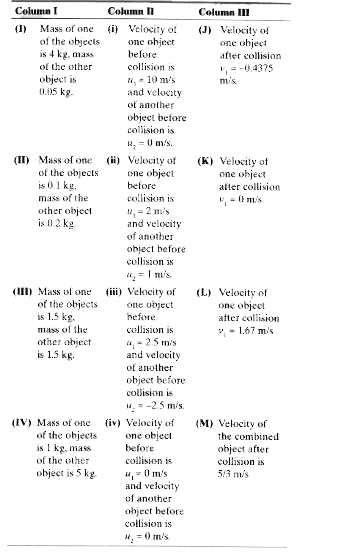
In which condition is the velocity of one of the objects after collision 1.165 m/s ?
(II) (ii) (J)
(III) (iv) (M)
(IV) (i) (L)
(II) (ii) (L)
The correct Answer is:C, D
Topper's Solved these Questions
- FORCE AND MOTION - I BOOK - RESNICK AND HALLIDAYCHAPTER - FORCE AND MOTION - I EXERCISE - PRACTICE QUESTIONS (Integer Type)
3 Videos
- FORCE AND MOTION - I BOOK - RESNICK AND HALLIDAYCHAPTER - FORCE AND MOTION - I EXERCISE - PRACTICE QUESTIONS (Linked Comprehension)
10 Videos
- FLUIDSBOOK - RESNICK AND HALLIDAYCHAPTER - FLUIDSEXERCISE - PRACTICE QUESTIONS (Integer Type )
5 Videos
- FORCE AND MOTION-IIBOOK - RESNICK AND HALLIDAYCHAPTER - FORCE AND MOTION-IIEXERCISE - PRACTICE QUESTIONS (Integer Type)
1 Videos
Similar Questions
In each question, there is a table having 3 columns and 4 rows. Based on the table, there are 3 questions. Each question has 4 options (a), (b), ( c) and (d), ONLY ONE of these four options is correct.
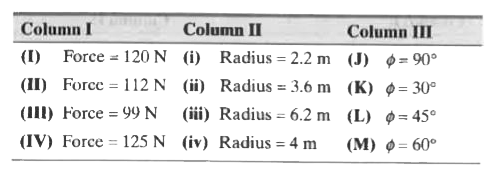
Which object has 137.5N⋅m as the resulting torque (as a vector)?
View SolutionThe following table has 3 columns and 4 rows. Based on table there are THREE questions. Each question has FOUR options (A) , (B) , ( C) and (D) . ONLY ONE of these four options is correct
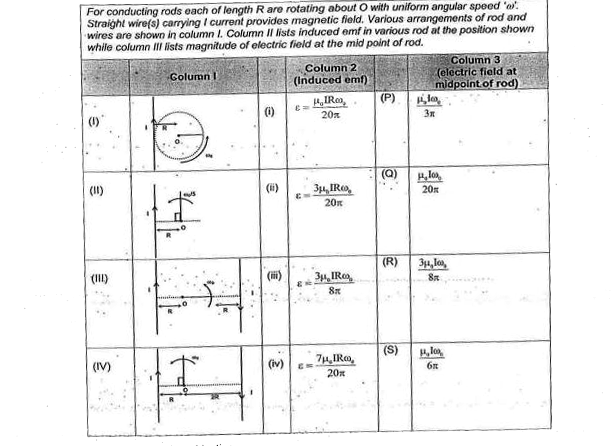
View Solution
Knowledge Check
In each question, there is a table having 3 columns and 4 rows. Based on the table, there are 3 questions. Each question has 4 options (a), (b), ( c ) and (d), ONLY ONE of these four options in correct.
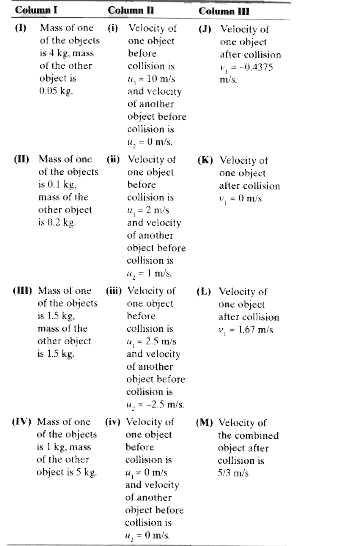
In which condition is the velocity of one of the objects after collision 35 m/s ?A(I) (iv) (J)B(IV) (ii) (L)C(II) (i) (K)D(I) (ii) (M)In each question, there is a table having 3 columns and 4 rows. Based on the table, there are 3 questions. Each question has 4 options (a), (b), ( c ) and (d), ONLY ONE of these four options in correct.
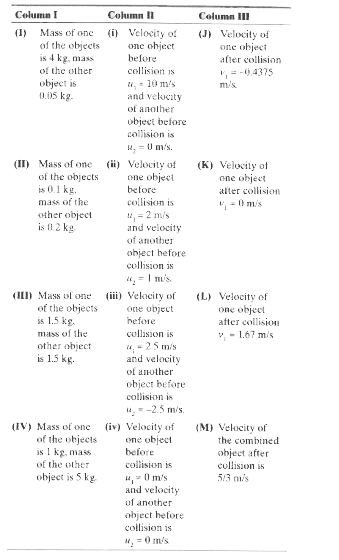
In which condition is the total momentum after collision 10 kg m/s ?A(I) (ii) (J)B(IV) (i) (M)C(II) (iii) (K)D(I) (i) (L)In each question, there is a table having 3 columns and 4 rows. Based on the table, there are 3 questions. Each question has 4 options (a), (b), ( c) and (d), ONLY ONE of these four options is correct.

Which object has 480N⋅m as the resulting torque (as a vector)?A(I) (iv) (J)B(I) (i) (K)C(III) (iii) (L)D(I) (ii) (L)
The following tables has 3 columns and 4 rows. Based on each table, there are THREE questions. Each question has FOUR options (A), (B), (C), and (D). ONLY ONE of these four options is correct
Q
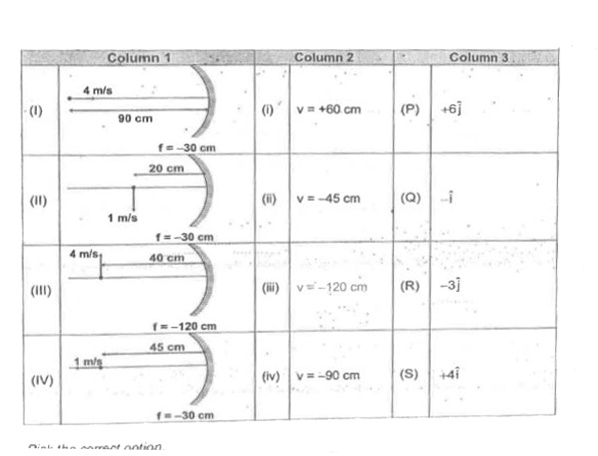
View SolutionThe following tables has 3 columns and 4 rows. Based on each table, there are THREE questions. Each question has FOUR options (A), (B), (C), and (D). ONLY ONE of these four options is correct
Q
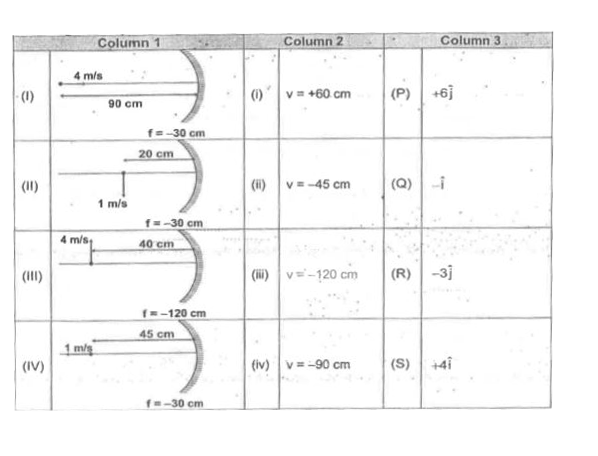
View SolutionIn each question, there is a table having 3 columns and 4 rows. Based on the table, there are 3 questions. Each question has 4 options (a), (b), ( c) and (d), ONLY ONE of these four options is correct.
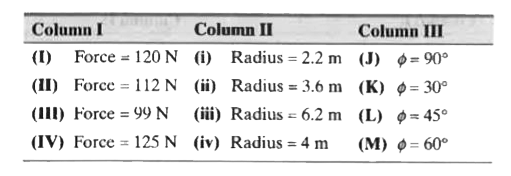
Which object has 178.2√3N⋅m as the resulting torque (as a vector)?
View SolutionIn each question, there is a table having 3 columns and 4 rows. Based on the table, there are 3 questions. Each question has 4 options (a), (b), ( c) and (d), ONLY ONE of these four options is correct.
A ball is projected from the ground with velocity v such that its range is maximum. Answer the questions by appropriately matching the information given in the three columns of the following table.
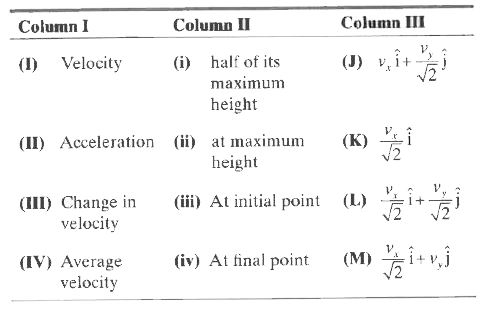
Which is the correct option to represent a point on trajectory at which the particle has only one component of which quantity?
View SolutionIn each question, there is a table having 3 columns and 4 rows. Based on the table, there are 3 questions. Each question has 4 options (a), (b), ( c) and (d), ONLY ONE of these four options is correct.
A ball is projected from the ground with velocity v such that its range is maximum. Answer the questions by appropriately matching the information given in the three columns of the following table.
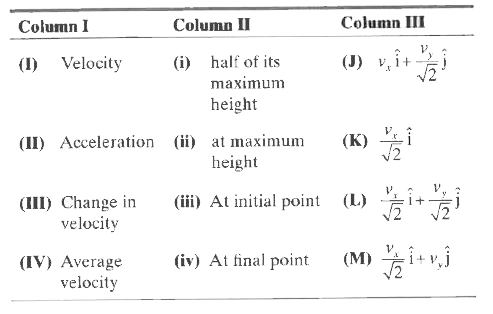
Which of the following is the correct columns match ?
View Solution
